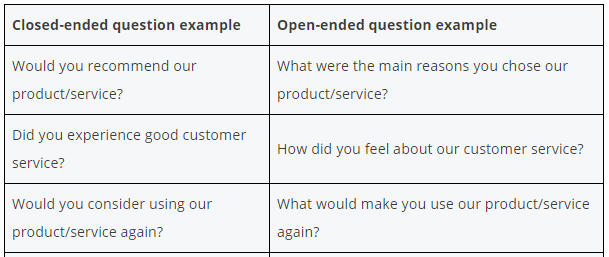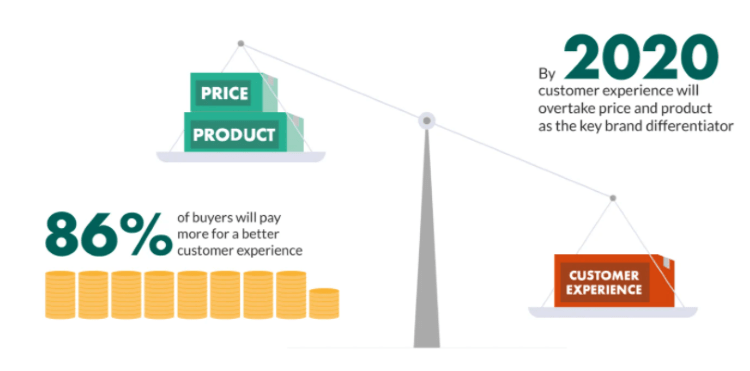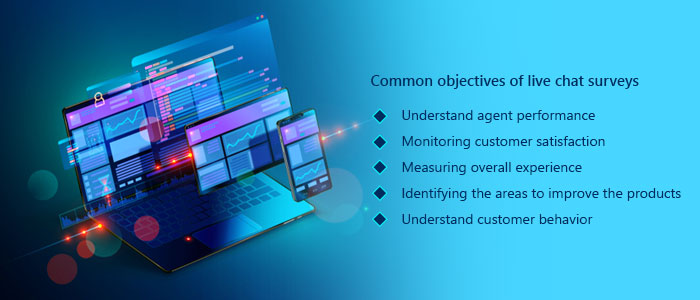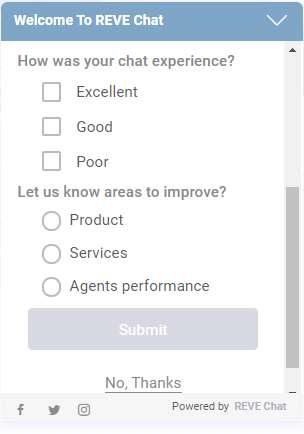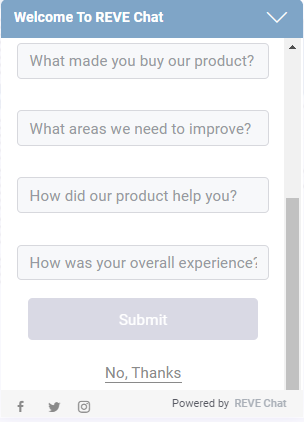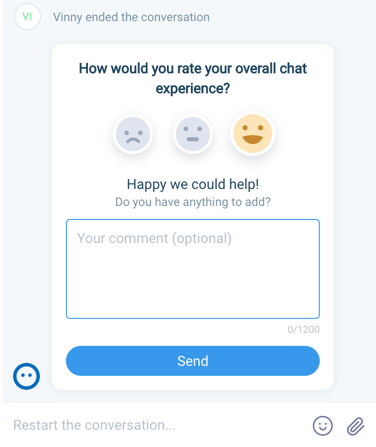6 Tips and Best Practices to Implement The Post Chat Surveys
- October 28, 2020
- 11 mins read
- Listen

Table of Content
Most businesses try to differentiate in terms of customer experience, but they don’t know exactly where and how to start. “77% of customers would recommend a brand to a friend after having a single positive experience”. A good beginning is essential for businesses to achieve the identified goals. So, what could be the best way to understand consumer behavior?
Post chat surveys can be a great tool to collect, analyze, and measure customer feedback in order to boost customer satisfaction.
Using live chat surveys allows you to demonstrate that you value your customer’s opinions while gaining important information about the kinds of products, services, and enhancements they might be willing to pay for.
What is a chat survey?
A chat survey refers to the ways of collecting customer feedback to access their overall experience across channels like the website, mobile apps, or in-app by rating the agent’s performance and quantity of products or services. It is an important feature of live chat software that can be customized with a greeting message and feedback option that matches your business requirements.
Chat surveys are simple yet effective ways to learn customer perception about your business. It is one of the best ways to understand the gaps in your client support and enhance customer retention strategies. The survey questionnaire needs to be prepared based on your business needs to fruitful outcomes.
Types of chat surveys questionnaire
When conducting live chat surveys, asking the right questions is imperative for making the survey effective. The survey questionnaire can be classified into two main categories.
- Open-ended questions – These questions are ones that require more than one-word answers. The answers could come in the form of a list, a few sentences, or something longer such as a speech, paragraph, or essay. These questions require an answer with more depth and a lengthier response.
- Closed-ended questions – These questions are the ones that can be answered in only one word or with a short, specific piece of information. Closed-ended questions can be answered with “Yes” or “No,” or they have a limited set of possible answers (such as A, B, C, or All of the Above).
Pro tip: Closed-ended questions are recommended for surveys because the response rate is higher when users do not have to type a lengthy answer. However, identifying the scenarios beforehand and using the open and closed-ended questions is the key to better outcomes.
What are the key benefits of post chat surveys?
Businesses relying on live chat surveys witness the benefits of not only building better products or services but also improve the overall customer experience. Analyzing the survey results thoroughly develops opportunities for business growth.
The key benefits of chat surveys are as follows:
Collect real time customer feedback
Chat surveys are one of the most efficient ways to acquire customer feedback. It allows customers to share their positive and negative feedback about the product or services. Getting real time feedback makes a big impact on the customer experience. Surveys help to build loyalty and increase your popularity as they engage customers and strengthen relationships.
Understand your agent performance
Knowing your agent’s or team performance helps to refine your strategies through training, workshops, etc. Chat surveys used after every customer service conversation, help to provide effective feedback about ‘how much satisfied they were interacting with the agent’ on a scale of 1 to 5 – with 5 being the highest score. The higher score indicates that the customers are more satisfied.
Analyze customer behavior
Customer behavior is a key attribute of marketing research. It helps in analyzing the purchase habits of the consumers to improve their experience. Chat surveys are a great way to gather valuable insights that help to define clients’ behavior and create profiles. Segmenting customers into various categories helps you to identify their purchase behavior and make sales projections.
Improve the quality of products & services
Businesses may not be aware of how much their products and services are being acknowledged by the customers. Through chat surveys, you can prepare questions to collect feedback, and after analyzing them carefully. Finally, put the consolidated results together that helps you to draw improvement ideas.
How to create meaningful chat surveys (Best practices and Examples)
Undoubtedly, the chat survey is a helpful tool to obtain customer feedback which is crucial for every business. Satisfied customers typically become loyal customers and come back for further repeat purchase and recommend you to friends. Finding out what it is that satisfies your customers can help your business succeed.
To find what makes the customers happy, you have to create meaningful chat surveys by following the right steps.
Let us discuss the various steps and best practices for an effective post-chat survey.
1. Identify the objective of the chat survey
Establishing clear survey goals and objectives is an essential first step in the survey process as it determines the “purpose” of the survey. The goals help you administer the appropriate questions to the right target groups. This is where to start if you want to engage your customers and get valid feedback that will help you make the right decisions.
The common objectives of a survey can be as follows.
- Understand agent performance – It helps to understand whether the customers were able to get answers or solutions to the queries they reported.
- Monitoring customer satisfaction – You can gauge how far your customers are satisfied with the quality of the products and services you are offering.
- Measuring overall experience – Gain insights on the overall chat experience through the website, mobile apps, and in-app.
- Identifying the areas to improve the products – Learn the loopholes in the product and enhance the quality to align with customer needs.
- Understand customer behavior – Know about the continuously changing behavior of the customers for building a strong product and better quality services.
Note: Once the goals are defined, you need to segment your target audience and to streamline your survey questions to get better results.
2. Ask the chat survey at the right time
Timing is very critical to get the most out of chat surveys. Here time refers to the phase in the customer journey where you can start the chat survey. When is the right time for you to get the most validated data? This is just as important, maybe even more than how you ask your questions.
You absolutely must be able to time your survey well across the right channels, so that you can get completely accurate and honest data. The channels could be the website, in-app or mobile apps.
If you start a chat survey at a time when respondents don’t want to see it, then they will most likely react to it negatively. They would probably just blaze through it or even refuse to answer it. In either situation, you get inaccurate data about the target market that you want to gather information from.
Best practices
- If you are having a chat survey over the website, you can ask after every conversation to understand how satisfied they were interacting with the live support agent.
- In case you have an eCommerce business, you can ask for customer feedback after every successful conversion to know how smooth their buying experience was.
- For a SaaS business, the right time to start a chat survey is while the customer is using the product.
3. Keep chat surveys brief
Time is a great factor for customers. They do not prefer investing too much time in responding to lengthy chat surveys. Hence, it is recommended to make your survey questionnaire short and actionable. Doing so will help you to get a genuine response from customers.
Short chat surveys help with both quality and quantity of response. Focused surveys generally have higher response rates and lower cart abandonment among survey respondents.
Chat survey best practices
- Mind the length of the chat survey questionnaire – Value your customer’s time and limit the length of the post-chat survey from 2 to 5 questions, governed only by what is important to the visitors.
- Keep it simple – Ensure that the survey questions are simple and straightforward so that customers can report their positive or negative experience with the chat agents, or confirm that their expectations were fully met or not.
- Combine your survey with open and close-ended questions – Identify the places where to use open or closed-ended survey questions. Close-ended queries give respondents specific choices of yes/no making it easier to analyze results. Open-ended survey questions provide qualitative information and insights.
4. Prepare advanced chat survey questionnaire
Not every chat survey is simple. In some cases, you need to gain more understanding of the customers. For that, you need to have to identify the scenarios and prepare an advanced chat survey questionnaire. You have to make the right use of open-ended and closed-ended questionnaires accordingly.
Closed-ended questions are those which can be answered by a simple “yes” or “no,” multiple-choice, or rating scale while open-ended questions are those which require to be expressed in a sentence and are more valuable than a simple one-word answer.
Scenario A – If you want to measure your agent’s performance, you can use closed-ended questions in your survey questionnaire.
Scenario B – If your chat survey is for knowing and evaluating your product quality or customer behavior, the closed-ended questionnaire is recommended. It allows customers to express their experience in their own words.
Chat survey best practices
- Identifying the scenarios to prepare an advanced survey questionnaire helps businesses to measure the end goals of the survey effectively.
- Businesses can get relevant responses faster if the questions are prepared based on the scenarios.
5. Ask for additional feedback
Providing customers an option to provide additional feedback can be a great way for making chat surveys successful. Asking for additional feedback also shows how much you value your customers and their opinions matter a lot.
For example, if the customer clicks on “Good” for the service experience, the follow-up question could be, “Can you tell us a bit more on how to improve our support services?”
The statement acknowledging the customer’s response provides a level of personalization and encourages him or her to give additional comments.
Analyzing the additional feedback provides valuable insights on areas you can improve to build a stronger product, improve customer service training, add value to services, etc. It also helps you to personalize your follow-up services that can enhance customer relationships.
Chat survey best practices
- Giving additional feedback should not be optional. Making it mandatory might impact customer experience and lose a potential customer.
- An open-ended question followed by a box to provide additional comments can appeal to customers to share their opinion with the brand.
6. Measure your post-chat survey results
Businesses that focus on conducting chat surveys, but miss out on measuring the survey results end up with siloed results. Hence, the evaluation of data cannot be ignored. It is the final and the most important step where the survey results are consolidated and analyzed thoroughly.
The post-chat survey results help your brand understand the customer’s perspective and improve the customer journey. The key metrics that help to measure the survey data are as follows:
Net Promoter Score (NPS)
It is a customer experience (CX) metric that surveys customers based on one question:
“On a scale of 0 to 10, how likely are you to recommend us to a friend or colleague?”
Using NPS surveys, helps you to identify your promoters, passives, detractors. After categorizing the groups, you need to plan a better engagement strategy to convert the detractors to promoters.
Customer Satisfaction Score (CSAT)
CSAT is a customer loyalty metric used by companies to evaluate “how satisfied a customer is with a particular interaction or overall experience on a rating scale. CSAT survey helps to know if the customer is satisfied interacting with your business.
It is assessed by asking customers to rate on a five-point scale—1 being very unsatisfied and 5 being very satisfied—what their overall satisfaction was with a product, service, or specific interaction.
Chat survey best practices
- Measuring the customer survey results regularly helps to identify your promoters & detractors and plan better ways to approach them.
- Prepare a specific survey questionnaire for the detractors and try to reach out to them to understand the reason for their disinterest to get better results.
Final thoughts
Chat surveys are very important to measure real time feedback and especially on your website to get insights on customer satisfaction and the improvement areas. A post-chat survey provides a personal touch that shows the customer you care about the service and experience provided.
Hence, post chat surveys can be great tool to gain customer insights and understand their behavior to improve their support as well as overall website experience.

